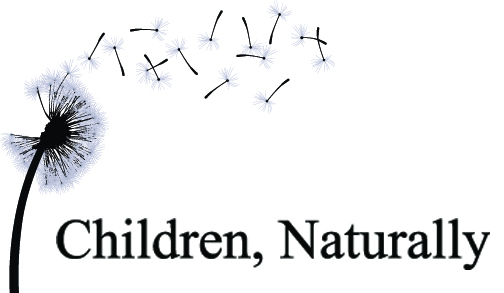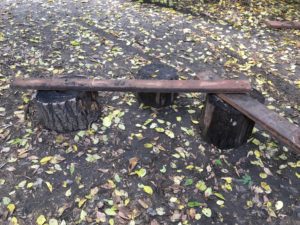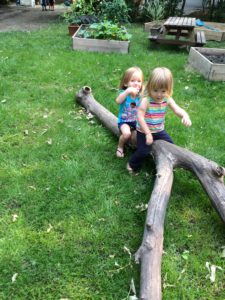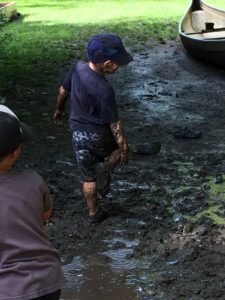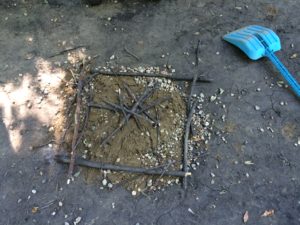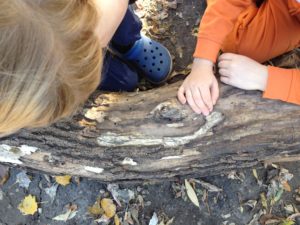Close your eyes. Now think back and picture all the things you did as a kid. All the places you played, the games and activities you played, and who you played with. I bet as you remembered you smiled, a lot! You probably even laughed a little. If are doing this with another person near you, you might have even shared some stories. I would bet a lot of these activities were outside, without close adult supervision (that you know of because parents always seemed to know exactly where we were and what we were doing). I would also venture to guess a lot of these activities were unstructured, outside in the neighbourhood with neighbourhood kids or in the pasture or wooded area if you were on a farm or other rural area. Whenever I ask people to do this, it always makes me smile to see how much pure joy it bring to them.
Now list all the things your child/ren play today. How much of it is inside; in front of a tv, video gaming system, or a computer? How many organized activities are on the list? I know there are benefits to structured and organized sports and activities for children but it seems to be taking over all their time. There is so much researched based evidence that shows children need a lot of unstructured, adult-free play time. This type of true free play has become something we need to advocate for and defend. There has been so much pressure from outside sources and other parents to be thinking about university by the time they enter kindergarten that the value of play has all but disappeared.
“Preschool is not boot camp for kindergarten.” -Lisa Murphy
As a parent, when I went to parent/teacher interviews what I wanted to know was did my child have friends? Did my child play well with others? The academic questions came later. I wanted to know how they were doing socially and emotionally. For children to succeed in life they need social and emotional skills. These are learned through interacting with others and playing! As pointed out by Lisa Murphy, play is our foundation. If we have a good foundation we can grow from there.
When I say children learn through play, I am talking about things like:
| Social/Emotional skills | -playing with other and being able to negotiating roles in a games such as mom, dad, or superhero
-being able to identify and regulate their emotions. -being able to understand others feelings. |
| Literacy Skills | -creating signs such as creating signs and pictures for their play areas
-writing down their ideas and stories -making lists |
| Language skills (including communication skills) | -being able to communicate clearly with other. -discuss ideas. -explain thoughts |
| Thinking Skills | -figuring out the solution to a problem like balancing a plank between 2 stumps -working out problems that arise in play -figuring out how things work |
| Math | -looking for the biggest stick -figuring out how many pails of sand for a large sand cake-counting the spot on a lady bug |
| Science (including physics, chemistry) | -blowing bubbles and observing that they are always round.
-making volcanoes in the sand box -exploring nature (bugs, trees, mud, puddles) -asking questions and figuring out the answers |
| Physical (large and small muscle skills) | -using writing tools, scissors, picking flowers
-handling small bugs gently -running barefoot -jumping off stumps -throwing balls, snowballs, water fights -hanging, balancing, climbing, swinging |
| Creativity | -making sand and mud pies.
-creating a whole waterway in the sandbox -art with various mediums such as flowers, pebbles, sticks |
The world needs more out of the box thinkers to help us solve the worlds biggest problems like climate change. We don’t need any more paint by number, follow the flow people. Creative thinkers come from being allowed to play.
“Play is the most useful tool for preparing children for the future and its tasks.”
-Bruno Bettelheim, “The Importance of Play”
References:
Elkind, David. The Power of Play: Learning What Comes Naturally.
Cambridge: Da Capo Press, 2007.
Murphy, L. (2016). Lisa Murphy on play: The foundation of childrens learning. St. Paul, MN: Redleaf Press.
Raoul33. (2011, April 09). Retrieved May 05, 2019, from https://www.youtube.com/watch?v=6DuAqqj4Krg
